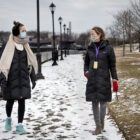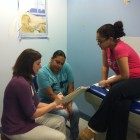I-Team In-Depth
Medical Providers Are Taking Nature Therapy Seriously
|
Schools were closed and online learning was in full swing last March when a teenager and her mom arrived at Fair Haven Community Health Care in New Haven. The girl had been experiencing chest pains and her worried mother thought she should go to the emergency room, recalled Amanda E. DeCew, a Fair Haven clinic director and pediatric nurse. The girl “was spending her entire day inside and had been inside for like two weeks,” DeCew said. “But the more we got into her symptoms, the more I really felt like this was anxiety and nothing that she needed to go the emergency room for.”
But DeCew also knew that some kind of medical intervention was needed. “I’m going to write a park prescription for you,” she told the girl.



